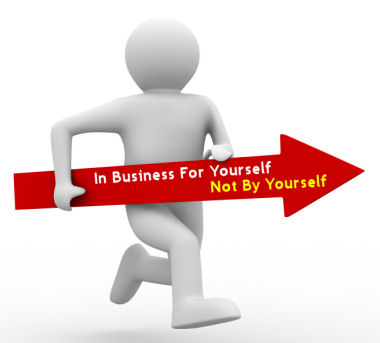Definition
Franchising offers an excellent opportunity for you to be in business for yourself. When you hear the word " Franchise" you probably think of fast food restaurants such as Burger King, McDonald's or Subway. But the truth is Franchising is so much wider than that.
In simplistic terms, franchising is where a successful business format is replicated. This will involve the setting down into an operations manual all the systems and procedures that the business owner has found gives them the best chance of success. Anyone joining the franchise will be expected to operate the business exactly as set out in the manual.
 The purchase of a franchise will involve the payment of an initial fee to the franchisor for the right to use the brand name as well as ongoing royalty or management fees. The franchisor will provide initial training and support and will have an ongoing involvement in your business to assist you and support you in all aspects of the franchise operation. The purchase of a franchise will involve the payment of an initial fee to the franchisor for the right to use the brand name as well as ongoing royalty or management fees. The franchisor will provide initial training and support and will have an ongoing involvement in your business to assist you and support you in all aspects of the franchise operation.
Why do companies franchise their businesses
For a company with a product or service to sell, franchising provides an excellent opportunity for rapid expansion without an enormous outlay of capital. It is a distribution system that allows a business to conserve capital, and at the same time achieve fast market penetration making it a very attractive proposition to most business owners.
One of the greatest advantages to them is that they get 100% commitment from their franchisees who have a stake in the business rather than staff or managers who simply work for a salary and may be less motivated. Franchising enables them to utilise the entrepreneurial skills of the franchisee network to achieve better results than might otherwise be achieved.
For any company franchising their business it is important that the business model has been carefully researched and refined. It needs to be simple enough to be capable of being replicated and the business system itself has to be clearly set out into an operations manual that covers every aspect of the business.
Franchisor's understand that this is is not a quick way for him to make money, but a sensible way to expand and get on board people that are equally committed to the business success.
The Practical Elements
Compared to starting your own business from scratch franchising can provide a relatively safer route into self employment. The franchisor has established a tried and tested path through the maze, and will have eliminated many of the mistakes that are often made when starting a business. It is this experience and system that you are paying for when you buy a franchise.
One element with franchising to be wary of is also part of franchising's strength. As a franchisee you will be expected to follow the system that you have purchased. This can be difficult if you are an entrepreneur. Franchisor's will always listen to new ideas and improvements but for the most part will expect the system to be followed to the letter. Each outlet should have a standard look and feel which builds confidence in the consumers eyes.
Whilst franchising is a safer route into self employment, it is not just a question of turning up, paying your money and being successful. The franchisor will not do your work for you and cannot be expected to. What is supplied is a proven format, name awareness, support and guidance. It will be still be your hard work and skills that make the business work in your area.
 As a franchisee you will have access to market knowledge, established name awareness in the business sector that you will be operating in, training and marketing help. You will often take part in and contribute to national advertising campaigns which would otherwise be outside your reach. As a franchisee you will have access to market knowledge, established name awareness in the business sector that you will be operating in, training and marketing help. You will often take part in and contribute to national advertising campaigns which would otherwise be outside your reach.
Franchisors not only have sound training programs, but also knowledge of financial requirements, marketing, competition & buying contracts - knowledge that might take you years to collect on your own.
Financially
You will pay the franchisor an initial franchise fee and the costs of shop fitting (where necessary) together with the costs of equipment required to run the business. Once established, you will normally pay the Franchisor a further monthly payment based on your turnover. This is known as royalties or monthly management fees. Effectively this is where you are paying for the ongoing support of the franchisor and his team. As the royalties are based on your turnover, it can be clearly seen that it is in the Franchisor's interest to help you succeed.
A word of Caution
One of the strengths of franchising is that you agree to run your business in the way that is set out by the franchisor utilising the plan as set out in the operations manual. You are utilising the Franchisor's experience and proven methods. Sometimes you will see business opportunities that your franchise agreement does not let you get involved in and this can be frustrating. e.g. If we say you were a Mcdonalds franchisee and all the fish and chip shops closed down you couldn't suddenly start selling fish and chips
to fill the need. If for example your agreement states that your have to buy your materials from a certain source you cannot just go out and source a new supplier. Franchisor's will have researched suppliers and may have very good reasons for utilising the chosen source. Of course you can recommend a change of supplier but the final decision will be down to the franchisor.
When you buy a franchise you need to be sure that you can work with the disciplines that the agreement and operating system will impose.
Relationships
A successful franchise relationship is like a partnership. It combines your talents with the experience and knowledge of the franchisor. It is important that before you purchase a franchise you talk to existing franchisees. You need to establish whether the franchisor has fulfilled his commitments to them and what their experience has been. Talk to more than one and get a balanced view.
With franchising, you are in business for yourself not by yourself. |